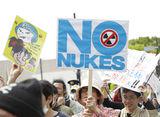Environmental Groups Respect Climate Scientists but Disagree over Nuclear Energy Recommendation

When four of the most prominent climate
scientists emerged this week and said that nuclear
energy was a must-have fuel to combat global
warming, the message caught their biggest fans
off-guard. Indeed, the green groups are saying that
the four know a lot about science but not that much
about nuclear power.
All such groups preface their remarks by saying how
much they admire and respect the
climate scientists who have made that
proclamation. After all, they are the ones who
raised the climate alarm to such a level that it has
become a focus in many parts of the world. But most
environmentalists are not moved, with their views
ranging from the cost of construction is too
prohibitive to the possibility that any accident
could reach proportions that make the risks
unaffordable.
“While solar power and wind power continue to march
down the experience curve to even lower costs --
solar panels have seen a staggering 99 percent drop
in cost since 1977 -- nuclear power has been heading
in the opposite direction,” writes Joseph Romm,
climate expert with the
Center for American Progress, in his blog.
“Nuclear power appears to have a negative learning
curve.”
He adds that if every major environmental
organization halted their opposition to nuclear
energy then it would still not have much affect on
whether new plants are getting built. That is a
function of economics, he adds -- that developers
can get other types of plants up-and-running much
quicker and at less costs. “(T)the nuclear industry
has simply been unable to to deliver a competitive
product,” Romm adds.
Environmentalists, generally, point to the Price
Anderson Act that reduces the risks to nuclear
energy companies in case of accidents. They also
call attention to the loan guarantees and
specifically the one for $8 billion given to
Southern Company and its partners to build two
reactors in Georgia.
For better or worse, those are still subsidies --
similar to the ones received for wind and solar
energies that nuclear operator Exelon Corp. has
railed against. The goal of nuclear’s subsidies --
just as it is for any fuel -- is to ensure plants
get built, economies of scale are reached and that
private financing is ultimately attracted.
Subsidy Addicts
As for nuclear energy, Doug Koplow, writing on
behalf of the
Union for Concerned Scientists, says that
nuclear’s subsidies are not cash payments; rather,
they shift construction costs and operating risks
from investors to taxpayers and ratepayers.
“Conspicuously absent from industry press releases
and briefing memos touting nuclear power’s potential
as a solution to global warming is any mention of
the industry’s long and expensive history of
taxpayer subsidies,” writes Koplow. He says that
there are more cost-effective ways to combat
climate.
“While we agree that the climate crisis is the most
urgent challenge of our time, this group fails to
acknowledge that wind, solar and efficiency are the
faster, cheaper, and safer way to fight the climate
threat,” adds Michael Brune, executive director of
the
Sierra Club in a formal response to the
scientists.
He goes on to say that Germany has vowed to get rid
of its remaining 17 nuclear reactors and to replace
much of that power with renewable energy.
Authorities have already shut down 8 such reactors.
And at its peak, nuclear energy had provided a
quarter of that European nation’s electricity mix.
But according to the
World Nuclear Association, the move has only
increased coal’s market share there: It was 43
percent in 2010 and it is 52 percent now. The
result:
Bloomberg news service is reporting that
Germany’s Environment Ministry said that carbon
dioxide equivalents rose from 917 million tons in
2011 to 931 million tons in 2012.
“There is ever-increasing recognition of the fact
that greenhouse gas emissions would be vastly higher
if nuclear energy facilities did not provide 40
percent of the electricity globally that is produced
by carbon-free sources,” says Marvin Fertel, chief
executive of the
Nuclear Energy Institute.
The letter capturing the public's attention has been
penned by James Hansen of Columbia University’s
Earth Institute and formerly of NASA as well as Ken
Caldeira, senior scientist at the Carnegie
Institution’s Department of Global Ecology, Kerry
Emanuel, climate scientist at MIT and Tom Wigley,
climate scientist for the National Center for
Atmospheric Research.
Greenies’ answer to them: Renewables are both
cheaper and safer. “No technology but nuclear is
capable of inflicting upon us all the horrifying
catastrophe now unfolding at Fukushima,” says Harvey
Wasserman, editor of
Nukefree.org.
Environmentalists’ long-standing view of nuclear
energy has “relaxed” but it has not changed. Such an
evolution will only occur if the technology is able
to work in Asia, where it is being highly utilized.
Until then, each energy segment will battle over
this nation's finite resources. While this is
happening, emissions will continue to flow -- and
the American public will be reminded time-and-again
of what the climate scholars have been saying.
Twitter: @Ken_Silverstein
Copyright © 1996-2013 by CyberTech, Inc. All rights reserved.
To subscribe or visit go to: http://www.energycentral.com
To subscribe or visit go to: http://www.energybiz.com
http://energybiz.com/article/13/11/environmental-groups-respect-climate-scientists-disagree-over-nuclear-energy-recommendation